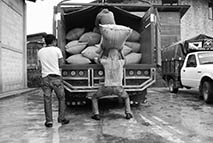
Fair Trade Coffee
Coffee grows high in the warm, humid mountains of southern Mexico. Small-scale farmers, most of whom are indigenous peoples, grow their crop on a couple of acres of land, barely eking out a living. Typically, they earn about $2 a day; this in spite of the fact that they grow some of the world’s best coffee. Fair Trade organizations pay farmers a higher price for their produce and guarantee that price throughout the length of a contract. This guarantee is important for farmers because the prices paid may fluctuate wildly throughout the year; with a guaranteed price, farmers can estimate what they will earn from their crop that year. In addition to higher and guaranteed prices, Fair Trade organizations help farmers in many other ways. Tosepan Titataniske, a Fair Trade cooperative in Cuetzalan, Puebla, has a bank that provides low-interest loans, classes on sustainable and organic agriculture methods and an ecotourism site that trains people in hotel and restaurant management. They’re also working to preserve Nahuatl culture and language. In Veracruz, the Mexican Vanilla Plantation is almost single-handedly bringing back vanilla as a cash crop and in Oaxaca CEPCO, a Fair Trade coffee organization, is helping farmers to diversify their crops while locating new markets where they can sell them. I traveled to three states to document the work of these and other Fair Trade organizations.
